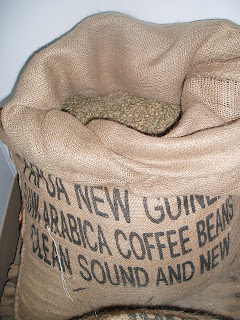The Story of
New Roots Coffee Company
How is the world did you get into
the coffee roasting business?
This is one of the first questions that people ask us when we tell them what New Roots Coffee Company is. I thought I would tell you the abridged story of how I came to be roasting coffee in Northern Wisconsin.
About a year before we would get married Katie and I 'went out for coffee' together for the first time. It was a tiny storefront coffee shop/café with loads of hippy college students, bare brick walls, worn hardwood floors, a single bathroom in the basement and great local artwork on the walls. The place was Coffee News Cafe and it is still located on Grand Avenue just west of Snelling Avenue in St Paul, MN. It was here that both of us shared that we would love to own a coffee shop someday. That was late 1999.
After five years in my (Joseph's) first career, I got burnt out. Then, I worked construction for two years and decided that it didn't fuel my passion. I saw a coffee shop for sale and investigated purchasing it. After deciding that taking over someone else's business wasn't for me, I looked at starting a coffee business from scratch. I discovered that there was not a single wholesale specialty coffee roaster within one hour of Wausau,WI, so I wrote a detailed business plan and finagled the financing to do things right.
We remodeled half of the basement of our home and shoehorned a used 1400lb. Probat L12 coffee roaster down the stairs.
Getting the coffee roaster through the door and down the stairs
We ordered bags of green coffee from Colombia, Ethiopia, Papua New Guinea, Guatemala, Rwanda and Sumatra through Cafe Imports in St. Paul, MN totaling 834 lbs. On November 13th, 2007 New Roots Coffee Company LLC was officially in business.
Joseph using his farm-boy skidsteer skills to unload the green coffee from the semi.
I had the honor of being trained by coffee legend, Victor Allen Mondry, who dropped out of medical school in 1979 to start a little shop in Madison called Victor Allen's. Victor is still my mentor and friend and recently told me, "I'm proud of you." which did my soul well. Victor also helps me source some of the coffees that I have offer.
Sample roasting at Victor's old cupping lab in Paoli, WI
Along they way we became members of the Specialty Coffee Association of America (SCAA) and attended their annual convention in Long Beach, CA. We were blown away by being in the midst of coffee farmers, baristas, roasters and other professionals from over 30 countries. Through SCAA we have received extensive hands-on training in coffee cupping, roasting, brewing and espresso.
We became a Fair Trade Certified licensed coffee roaster and have done everything we can to be a business that is socially and environmentally responsible and that makes the world a better place to live in. We believe in roasting coffee that helps coffee farmers make a reasonable living, is grown sustainably and is exceptional in your cup so everyone wins.
We got into coffee roasting because we have a passion for coffee. We will never have a huge selection, but you can be assured that the coffee that we offer will be carefully selected for its outstanding aroma, taste and body.

 I have had lots of people ask where I get my coffee from. As a wholesale coffee roaster, we get our coffee from a green coffee importer. They import the green coffee from 20+ countries, of the 40+ countries coffee comes from. They usually buy the coffee in shipping containers of 200+ bags.
I have had lots of people ask where I get my coffee from. As a wholesale coffee roaster, we get our coffee from a green coffee importer. They import the green coffee from 20+ countries, of the 40+ countries coffee comes from. They usually buy the coffee in shipping containers of 200+ bags. 